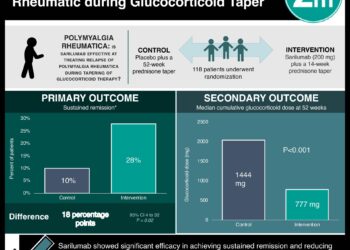Patient Basics: Polymyalgia Rheumatica
Originally published by Harvard Health.
What Is It?
Polymyalgia rheumatica is a form of arthritis. It causes pain in the joints and muscles of the lower back, thighs, hips, neck, shoulder and upper arms, and other parts of the body.
The condition occurs when the lining surrounding the joints, bursa and tendons near the shoulders and hips becomes inflamed.
The disease is centered on the joints (especially the shoulders and hips). But the discomfort is felt in the upper arms and thighs. This type of pain is called referred pain. It arises in one area but causes symptoms in another.
Typically, polymyalgia rheumatica affects people older than 55. Left untreated, it can lead to stiffness and significant disability. In some cases, symptoms do not get worse. They may even lessen in a few years.
In a minority of cases, polymyalgia rheumatica is associated with giant cell arteritis (temporal arteritis). This is a condition in which blood vessels are inflamed, especially in the neck and head. Untreated giant cell arteritis can cause blindness or stroke.
Symptoms
Symptoms of polymyalgia rheumatica can include:
- Sudden pain and stiffness in the:
- Shoulders
- Upper arms
- Neck
- Lower back
- Hips
- Thighs
The pain and stiffness tends to be worse in the morning.
- Low-grade fever
- Joint swelling
- Difficulty walking
- Weight loss
- Fatigue
Diagnosis
Your doctor will diagnose this condition based on a combination of:
- Your description of symptoms
- A physical examination, and
- Test results
Certain symptoms may suggest the presence of giant cell arteritis. These include scalp pain, headache, fever, or jaw pain when you chew.
An erythrocyte sedimentation rate (ESR) and/or C-reactive protein (CRP) blood test may be requested to measure inflammation throughout the body. Markers of inflammation are often elevated in people with this condition. The ESR and CRP tests may be used both to diagnose the condition and to check whether treatment is working.
Expected Duration
Without treatment, polymyalgia rheumatica sometimes goes away on its own over several years. With treatment, symptoms lessen or go away within days.
Treatment is generally necessary for at least six months. And it often continues for one to two years or even longer. Symptoms tend to come back if you stop or decrease your treatment.
Prevention
There is no known way to prevent polymyalgia rheumatica.
Treatment
Treatment usually begins with nonsteroidal anti-inflammatory drugs (NSAIDs). These include ibuprofen (Advil, Motrin) and naproxen (Aleve, Naprosyn). However, they are rarely very helpful.
Corticosteroids, such as prednisone, usually are required to effectively treat polymyalgia rheumatica. Low doses (such as prednisone, 10 mg to 15 mg per day) are highly effective.
Doctors may prescribe additional medications to prevent the side effects of prednisone. For example, calcium, vitamin D and alendronate (Fosamax) may be prescribed to prevent osteoporosis.
For people who have significant side effects from corticosteroids or when the dose of corticosteroids cannot be reduced to low doses without a return of symptoms, other drugs often are prescribed. These may include hydroxychloroquine (Plaquenil) or methotrexate (Rheumatrex).
Physical therapy may help to control discomfort. It can also help maintain the ability to move and function.
When To Call a Professional
If you have joint or muscle pain that is severe or sudden, especially if it prevents you from participating in your normal activities, contact your doctor.
The situation may be urgent if you have fever, visual problems or headache. These symptoms suggest that you could have giant cell arteritis.
Prognosis
Treatment may be required for years. But the outlook for people with polymyalgia rheumatica is excellent.
If you have giant cell arteritis, you may lose vision or develop other vascular complications (such as an aortic aneurysm).
Additional Info
American College of Rheumatology
2200 Lake Boulevard NE
Atlanta, GA 30319
Phone: 404-633-3777
Fax: 404-633-1870
http://www.rheumatology.org/
Arthritis Foundation
P.O. Box 7669
Atlanta, GA 30357-0669
Toll-Free: 1-800-283-7800
http://www.arthritis.org/



